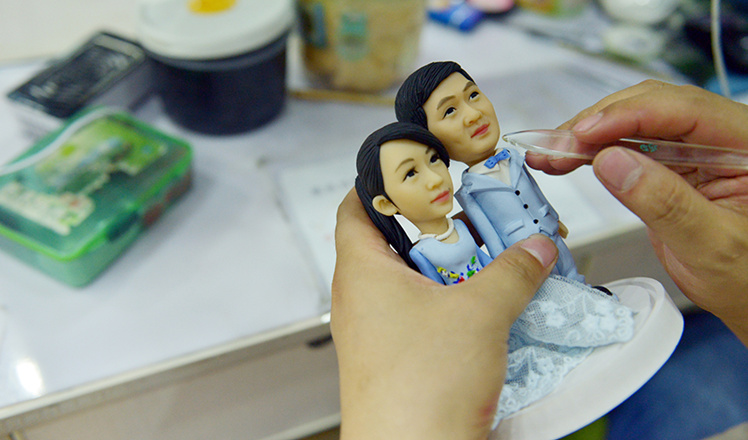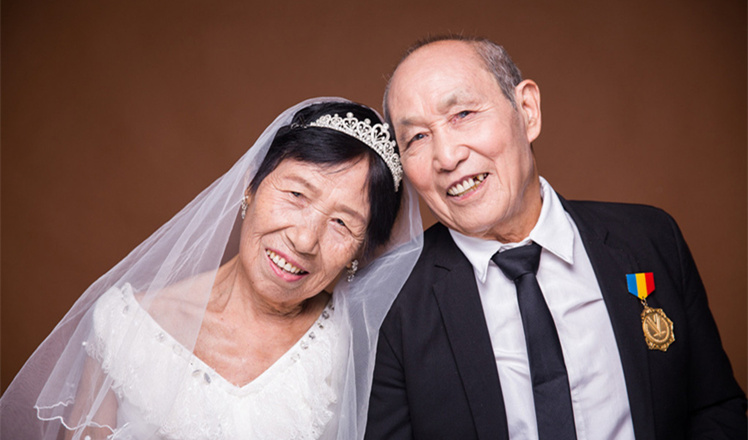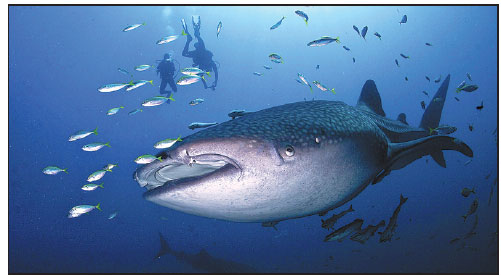Veteran recounts her underwater adventures in a new book
Updated: 2016-08-10 07:32
By Xing Yi(China Daily)
|
||||||||
Zhang Yiping tried scuba diving for the first time 10 years ago and fell in love with it.
Since then the Hangzhou native, who works as a web editor with the Zhejiang Daily media group, has dived all around the world.
In her new book, Three Thousand Meters Under the Sea - A Decade of Diving, Zhang recounts her adventures in the underwater world. The Chinese-language book was published by China Financial & Economic Publishing House in June.
How deep can one dive? Do sharks bite divers?
These questions from readers during the book launch in Hangzhou, capital of Zhejiang province, last month reminded Zhang of her first dive.
"I was so nervous that I held the dive instructor's hand very tight," Zhang says of her first diving experience, in Lombok island, Indonesia, in 2005.
But Zhang says her fear faded as she saw fish swimming in the coral reefs and she spotted a sea turtle.
"I felt a sense of urgency on my way back," Zhang says to an audience who had little knowledge of the sport.
"But this was because all of a sudden the map of the world waiting for me to explore expanded - the blue ocean was added."
Recreational diving has long been a popular leisure activity in the West, but there were few people who could provide such training on the Chinese mainland a decade ago.
The author, in her 30s, says in the book that she managed to find a Hong Kong instructor on Phuket island in Thailand. She was certified as an open-water diver in 2006.
A year later, she was trained in Malaysia to become an advanced open-water diver, which allowed her to dive to depths between 30 and 40 meters.
In the book, Zhang also tells of her encounters with different types of marine life, and tries to correct public misconceptions.
"People think sharks are very dangerous. But the fact is most sharks are afraid of people, and only very few attack people when they feel danger or mistake humans for seals," Zhang writes.
Zhang says in the book that during a diving trip in the Galapagos, a Pacific archipelago 1,000 kilometers west of Ecuador, she saw hammerhead sharks.

"There were probably 1,000 hammerhead sharks, and we watched them swim by for almost 10 minutes," writes Zhang.
In the book, Zhang says that jellyfish are much more dangerous for divers than sharks, because most of them are venomous. But she adds there are exceptions, like in Palau's Jellyfish Lake.
In the book, Zhang writes about the magical feeling of being surrounded by golden jellyfish, which are a unique nontoxic variety.
Zhang says she has been addicted to diving for many years. When she hasn't dived for some time and doesn't have a trip planned, the blue ocean often appears in her dreams.
"Many of my dive buddies have had similar experiences, and for some people it has lasted for so long that they decided to make diving their career," writes Zhang, who has resisted the temptation of becoming a dive instructor and still works in the Zhejiang Daily media group.
In the book, Zhang says that when she started diving in Southeast Asia, there were few Chinese divers, so local people often mistook her for Japanese and greeted her with a konnichiwa, hello in Japanese. But now, Zhang writes, most famous dive sites have dive shops operated by Chinese, and, even in local dive shops, staffers greet her in Chinese.
At least 1.5 million people in the country have tried scuba diving, according to a report released at the China International Diving Festival in Lingshui Li autonomous prefecture in Hainan province on July 31.
Speaking about diving, Zhang says: "People know so little about underwater life. For some, fish are just food.
"I am glad that, besides divers, many children are interested in my book. I hope my book can inspire the next generation to better protect the ocean."
Zhang dedicates a chapter to the coral reef-restoration project initiated by some Chinese divers in Shenzhen, Guangdong province, who have succeeded in planting some 5,600 coral in specially designed pots in the ocean.
Zhang stopped diving in 2014 after she got pregnant. Her daughter was born last year.
But she plans to return to the water. "The minimum age limit for scuba diving is 10. So maybe after another decade I can go exploring the ocean with my daughter as my dive buddy."
xingyi@chinadaily.com.cn
|
A close encounter with a whale shark is one of the biggest joys for scuba divers. Pan Yingjiu / Provided To China Daily |
(China Daily 08/10/2016 page19)
- New lab will explore South China Sea resources
- 40 telecom fraud suspects returned to China
- Cheery promotional video introduces G20 city Hangzhou to Europe
- Researchers claim intelligence services targeted Chinese airline
- Tunnel-bus production center faces delays
- Chinese Valentine's Day Special: Love conquers everything
- Nepal's newly elected PM takes oath
- Texas gun law worries incoming students
- China vows to deepen economic, trade cooperation with ASEAN
- Fire guts Emirates jet after hard landing; 1 firefighter dies
- Egypt's Nobel-laureate scientist dies of illness in US
- THAAD muscle flexing unmasks anxiety over declining hegemony

 Top swimmer Sun Yang makes sweet revenge
Top swimmer Sun Yang makes sweet revenge
 Lin Yue and Chen Aisen win Olympic gold medal
Lin Yue and Chen Aisen win Olympic gold medal
 Artist creates mini-mes for loving couples at Qixi festival
Artist creates mini-mes for loving couples at Qixi festival
 Skyscraper demolished outside ancient city
Skyscraper demolished outside ancient city
 Chinese Valentine: Love conquers everything
Chinese Valentine: Love conquers everything
 Ace swimmers make record-breaking splash in Rio
Ace swimmers make record-breaking splash in Rio
 Chinese weightlifter Long smashes world record
Chinese weightlifter Long smashes world record
 China wins first diving gold of Rio Games
China wins first diving gold of Rio Games
Most Viewed
Editor's Picks

|

|

|

|

|

|
Today's Top News
US launches airstrikes against IS targets in Libya's Sirte
Ministry slams US-Korean THAAD deployment
Two police officers shot at protest in Dallas
Abe's blame game reveals his policies failing to get results
Ending wildlife trafficking must be policy priority in Asia
Effects of supply-side reform take time to be seen
Chinese State Councilor Yang Jiechi to meet Kerry
Chinese stocks surge on back of MSCI rumors
US Weekly

|

|








